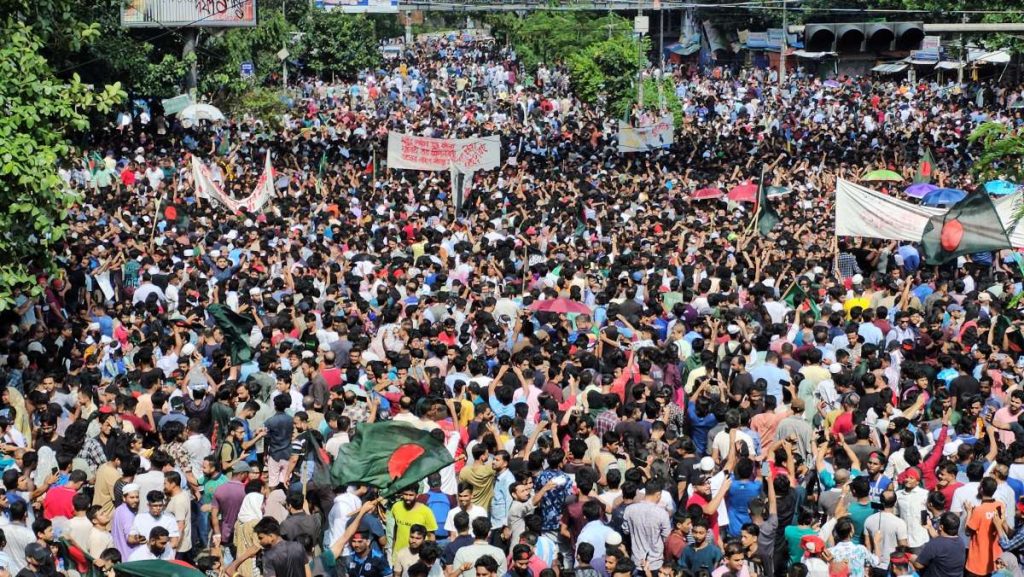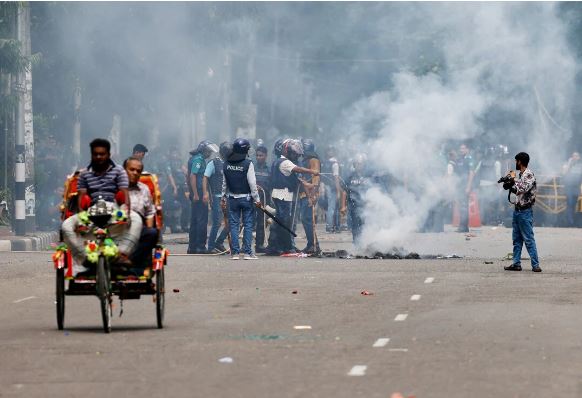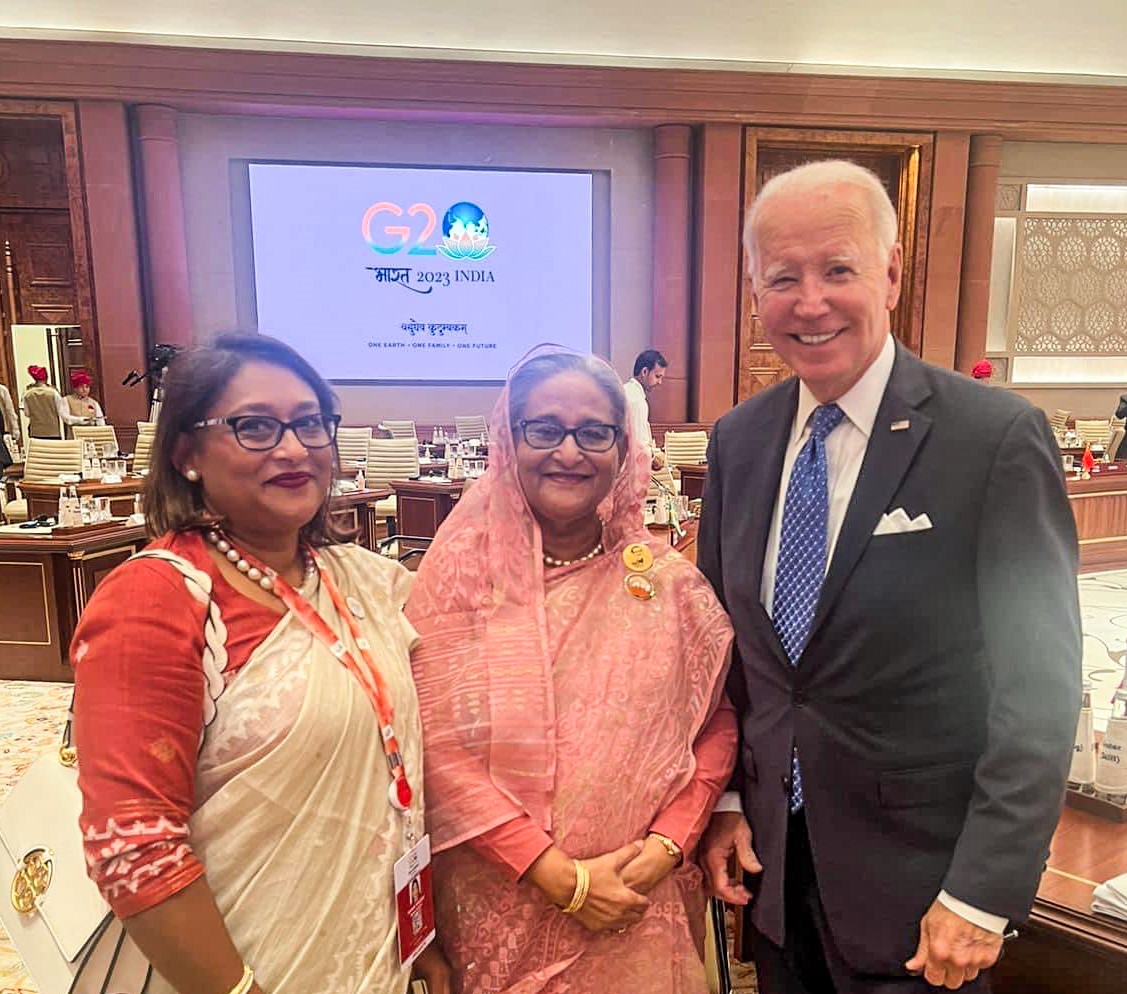While continuing to reward Pakistan by prioritising short-term geopolitical considerations, the Biden administration has been criticising democratic backsliding in Bangladesh…reports Asian Lite News
As the political tumult in Bangladesh sends security ripples across South Asia, many wonder if Washington played a role in the ouster of Shiekh Hasina.
Several international diplomats, including the US State Department spokesperson, were speaking on the events of the previous weeks without trying to verify the facts, revealing their dislike towards the government in Bangladesh.
For some time now, the administration of U.S. President Joe Biden had been targeting Bangladesh as the focal point of its democracy promotion efforts by dangling the threat of visa sanctions against officials who undermine free elections while staying silent on the undeclared martial law situation in Pakistan, where mass arrests, disappearances and torture have become political weapons?

While continuing to reward Pakistan by prioritising short-term geopolitical considerations, the Biden administration has been criticising democratic backsliding in Bangladesh. In 2021, it designated Bangladesh’s elite Rapid Action Battalion and six of its current and former leaders as complicit in, or engaged in, serious human rights abuses in relation to the country’s war on drugs, effectively freezing all their assets in the US.
In December 2023, Peter Haas, the U.S. ambassador to Bangladesh, insolently demanded that the authorities investigate a deadly clash between police and members of the BNP. Blinken told Bangladesh Foreign Minister Abdul Momen of his “concerns about violence against, and intimidation of, the media and civil society,” according to a State Department statement.
In a professed aim of free and fair elections in Bangladesh, US Secretary of State Antony Blinken threatened to withhold visas from individuals “responsible for, or complicit in, undermining the democratic election process”, clearly aimed at members of Hasina’s government.
In April 2024 Shiekh Hasina, contended that the U.S. is pursuing a strategy of regime change in her country. “They are trying to eliminate democracy and introduce a government that will not have a democratic existence,” she told parliament, “It will be an undemocratic action.”
Then in May 2024 Sheikh Hasina again talked of a ‘foreign conspiracy’ to topple her government, months before she was forced to quit. “If I allowed a certain country to build an airbase in Bangladesh, then I’d have no problem getting re-elected…The offer came from a White Man”, said Hasina. In this edition of the editor’s table, we explore whether a ‘western plot’ was in place to ensure Sheikh Hasina’s ouster from Bangladesh.
Indeed, despite mounting evidence that the quota movement was in fact a conspiracy and that the violence was deliberately being instigated by the Jamaat, ICS and BNP cadres, Western international agencies chose to target the Awami League government.
Several international organisations issued condemnations of violence against the protesters, with some even calling indirectly for regime change and sanctions against Bangladesh’s security forces, and accusing the Hasina government of indulging in systematic violations of human rights and autocratic practices, without trying to verify the facts, revealing their dislike towards the government in Bangladesh.
“Now is the time for influential governments to press Sheikh Hasina to stop her forces from brutalising students and other protesters,” said Meenakshi Ganguly, deputy Asia director of HRW. Ganguly also called for sanctions against Bangladesh security forces.
A group of UN experts issued a statement, demanding an independent probe into accusations of violence. They alleged that the Bangladesh government has no credibility in such matters, and cannot be trusted. “We are deeply concerned by reports of targeted attacks, threats, intimidation, and retaliation by the authorities and Government-aligned groups against protest leaders, political activists, human rights defenders and journalists,” the statement read.

Volker Turk, UN Human Rights chief, too asked for an independent investigation into the alleged human rights violations during the state’s crackdown on the protesters. “We understand that many people were subjected to violent attacks by groups reportedly affiliated with the Government, and no effort was made to protect them,”
It may be recalled that the West has not been sparing in its constant criticism of the Hasina government over human rights issues. The US and several other countries had questioned the legitimacy of the last elections in January, in which Hasina’s Awami League was reelected for a fourth consecutive term.
In April 2024, at a briefing titled “Indo-Pacific Strategy (IPS) and its implications for Bangladesh” Maxwell Martin, Indo-Pacific Strategy Officer at the US embassy in Dhaka revealed that as part of its Indo-Pacific strategy, the United States wants to see Bangladesh Armed Forces become a “net security provider in the region.” When asked about India playing a leadership role in the region in the implementation of IPS, Martin emphasised that the US looks at its relations with Bangladesh “on a bilateral basis”, “We don’t look at our relations through the lens of another country. This is something we hear in Bangladesh – that the US sees Bangladesh through the lens of India. I don’t think that’s true.”
Border Security Force (BSF) personnel stand guard as Bangladesh citizens arrive at the Petrapol checkpoint amid the turmoil in the neighbouring country, in North 24 Parganas. (ANI Photo)
Martin said the US wanted to help the armed forces achieve its Forces Goal 2030, ensure the country’s security, respond to manmade and natural disasters and engage more in UN peacekeeping missions. Martin said the recent emphasis on labour rights in Bangladesh, and the earlier emphasis on free and fair national elections, were part of the Indo-Pacific Strategy. “You’ve seen us be a bit more open and vocal. We are also ramping up our engagement with Bangladesh on multiple fronts – economic, political and security,” he said.
ALSO READ: Bangladesh’s Interim Govt to Be Sworn In Thursday
ALSO READ: Indian Visa Centre in Bangladesh Suspends Services

